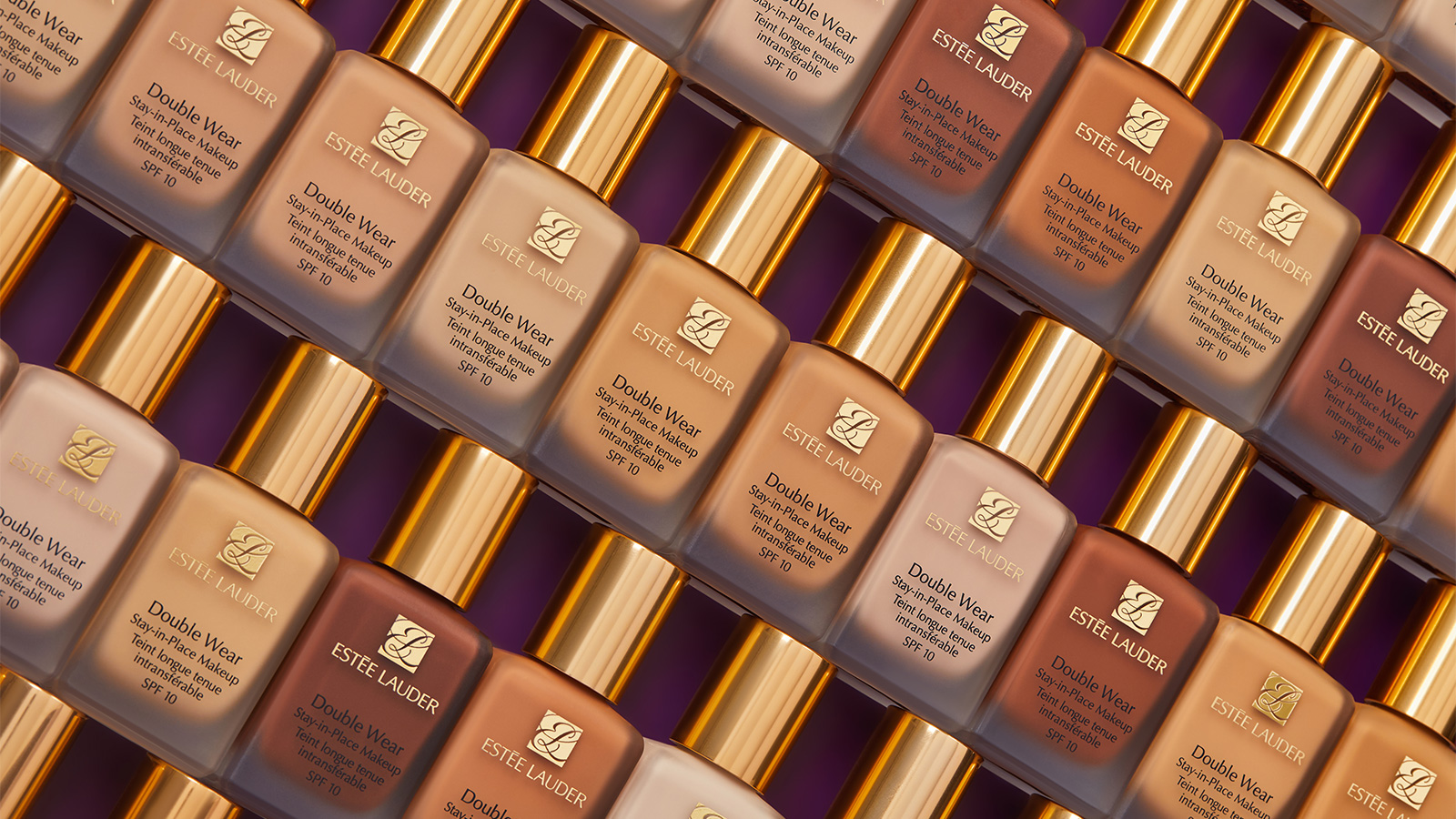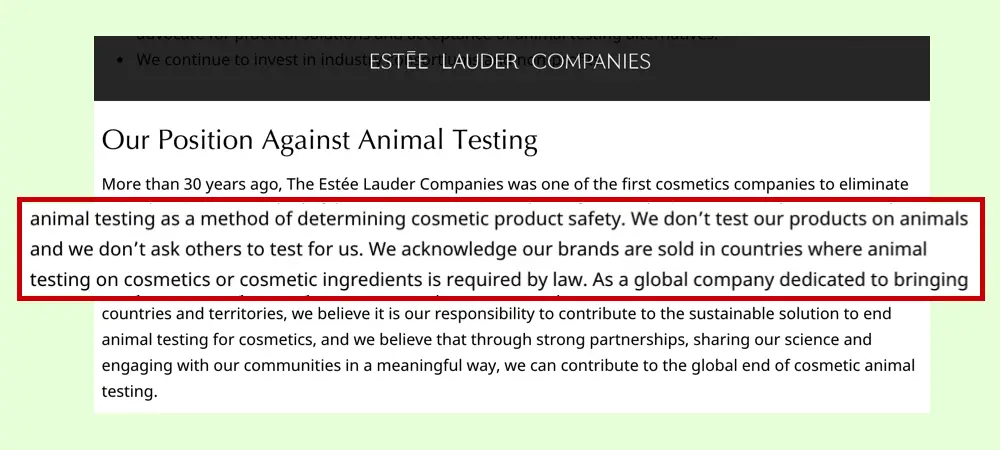One of America’s first luxury cosmetics brands is going strong after 75 years, but is its legacy ethical? Could it ever become cruelty-free and vegan?
Estée Lauder is not 100% cruelty-free or vegan, as its products are sold where animal testing is required by law. It also cannot be considered vegan as it is not cruelty-free.
Estée Lauder’s story reads like the American dream. The daughter of Hungarian and Czechoslovakian immigrants was able to launch her own beauty company in New York, 1946.
The founder worked her obsession with flowers into her formulas, and she used as many naturally derived ingredients as possible. Her Night Recovery was developed in 1982 and still sells 22 bottles every second today.
Estée Lauder markets itself as a brand that has set the standard for the beauty industry for decades.
But can any sustainable investments and female empowerment initiatives fix a brand’s reputation? Especially when it’s known that animal testing is an ‘indirect’ part of their business?
Estée Lauder's Ethical Overview
Estée Lauder Is Not Cruelty-Free
Test any of its products or ingredients on animals
NO
Purchase any ingredients tested on animals within its supply chain
no
Distribute its products to any countries that require animal testing by law.
YES
Estée Lauder is owned by ELC (Estée Lauder Companies). Out of the +25 brands in their portfolio, only 5 are cruelty-free.
But ELC still claims to have been at the forefront of stopping animal testing 30 years ago and fighting the practice in modern times.
What about the other 45 years…? Just asking.
Does Estée Lauder Test on Animals?
Estée Lauder is clear that it conducts animal testing when required by law and that it does ship to countries like China. However, it still has a detailed viewpoint on cruelty-free cosmetics.
What Is Estée Lauder's Cruelty-Free Status in 2022?
Here is a screenshot of Estée Lauder’s official statement regarding its cruelty-free policies and vegan products, taken from its website:
It’s important to note that while Estée Lauder continues to sell in China, ELC is partnered with 5 different industry groups and NGOs who lobby against animal-testing laws.
This includes Cruelty Free International, the animal protection and advocacy group responsible for Leaping Bunny Certification.
Does this mean Estée Lauder is certified with them?
No.
It does mean that ELC is using its vast resources to eventually end all animal testing.
Estée Lauder Has No Cruelty-Free Certification.
As long as Estée Lauder keeps selling in China, it cannot be cruelty-free certified.
Ideally, all brands that consider themselves cruelty-free should be Leaping Bunny certified.
While you might know PETA very well – it surprisingly doesn't hold the strictest cruelty-free regulations. Leaping Bunny certification is the gold standard to live up to.
Is Estée Lauder Sold Where Animal Testing is Required By Law?
Yes, Estée Lauder distributes its products in China, where animal testing on cosmetics is required as products arrive at the border.
China has a shocking track record. It is the country with the most animal testing globally, with over 20 million animals used per year.
However, if you live in China or are concerned about its cruel beauty policies, there are a couple of loopholes.
Here's how to find cruelty-free cosmetics in China: Are Cosmetics Made in China Cruelty-Free?
Estée Lauder is Not Vegan
Estée Lauder does not label any of its products as vegetarian or vegan.
And rightly so
It’s hard to consider any of its products that are free of animal-derived ingredients as “vegan” since it is not 100% cruelty-free.
Some of the most common animal-derived ingredients that Estée Lauder uses are: beeswax, lanolin, fish collagen, squalane, carmine, and whey protein.
Vegan Alternatives to Estée Lauder
Brand | price range | 100% vegan | Certification |
|---|---|---|---|
$15 - $240 | Yes | PETA, Leaping Bunny | |
$20 - $70 | Yes | Leaping Bunny | |
$25 - $250 | Yes | PETA | |
$20 - $45 | Yes | None | |
$20 - $90 | Yes | PETA, Leaping Bunny |
Estée Lauder Isn't Considered Natural or Organic
Estée Lauder makes no claims about being a natural brand. Some products have a minimum of 92% natural ingredients, and having a high amount of natural ingredients is a high priority for this brand.
Although Estée Lauder might use some organic ingredients, it is not certified organic, nor does it advertise itself as an organic cosmetics brand.
If a synthetic ingredient is "clean," it means it is safe and non-toxic for us. Its purpose is to preserve the stability of a beauty formulation.
Estée Lauder Has a 91% Allergen-free Ranking
According to Skin Safe, Estée Lauder has a 91% allergen-free ranking for most products, with some dipping to 82% and many reaching 100%!
Many of Estée Lauder’s products are free of allergens such as paraben, lanolin, fragrance, topical antibiotic, coconut, MCI/MI, nickel, gluten, soy, oil, irritants, and SLS.
Reading the ingredient list is crucial because Estée Lauder is not 100% hypoallergenic or non-comedogenic and does not claim to be.
However, certain products are specifically for these concerns, so make sure you buy what your skin needs.
The EU/UK Have Stricter Ingredient Regulations
We don’t want to scare you, but you HAVE to read up on any product’s ingredient list before you make a purchase – especially if you live within the United States. The reason why will shock you.
The FDA has only banned or restricted 11 harmful chemicals from cosmetics within the country. Europe and the UK, on the other hand, have banned 1,328!
Estée Lauder does call itself a clean beauty brand. It meets strict safety standards for the UK and EU markets, so you shouldn’t worry about any serious hidden nasties in its products.
It’s still worth knowing that with skincare and cosmetics, you want to avoid these ingredients:
And with fragrance, you want to avoid these ingredients:
Estée Lauder Has Some Sustainable & Ethical Initiatives
Some of the ethical causes Estée Lauder supports are:
It's no secret that the world has a huge waste problem, and cosmetic brands only make it worse by using unsustainable packaging and harmful ingredients.
Estée Lauder takes environmental accountability by:
Final Thoughts
Estée Lauder is not the brand for animal advocates, vegans, or environmental activists. While it may be doing more than most large beauty brands for society and the planet, it isn’t cruelty-free or vegan.
We do acknowledge it offers financial support to animal rights agencies and advocacy NGOs –
BUT
That doesn’t cancel out the amount of animal testing required to keep selling in regions that need it.
Their ingredients sourcing is surprisingly transparent, showing that it can improve and change. So, let’s keep telling Estée Lauder what it needs for us to willingly support it.


